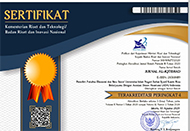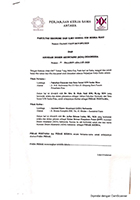THE EFFECT OF TALENT MANAGEMENT AND WORKLOAD ON EMPLOYEE JOB SATISFACTION
Abstract
Talent management is very important for organizations to be able to find the right people to carry out their work so that organizational performance will increase. Workload is one of the factors that will affect the performance of employees and organizations. This study aimed to determine the effect of talent management and workload on the job satisfaction of employees of the Regional Office of the Directorate General of Treasury, Ministry of Finance, Riau Province, either partially or simultaneously. Respondents in this study amounted to 40 people using the saturated sampling method (census). The data used are primary data and secondary data. The sampling technique in this study used a nonprobability sampling approach with saturated / census sampling techniques. The data analysis method used is a quantitative descriptive analysis with multiple linear regression. The results of the study show that talent management partially affects employee job satisfaction, as well as workload partially also affects employee job satisfaction Simultaneously talent management and workload influence the job satisfaction of employees of the Regional Office of the Directorate General of Treasury, Ministry of Finance, Riau Province. The magnitude of the effect is 67.1% while the remaining (32.9%) is influenced by other variables not examined in this study.
Keywords
Full Text:
PDFReferences
DAFTAR PUSTAKA
Afandi, P. (2018). Manajemen Sumber Daya Manusia (Teori, Konsep dan Indikator). Riau: Zanafa Publishing.
Barahama, K. F., Katuuk, M., & Oroh, W. M. (2019). Hubungan Beban Kerja Dengan Kepuasan Kerja Perawat Di Ruangan Perawatan Dewasa Rsu Gmim Pancaran Kasih Manado. Jurnal KEPERAWATAN, 7(1). https://doi.org/10.35790/jkp.v7i1.22876
Barney, J. (1991). Firm Resources and Sustained Competitive Advantage. Journal of Management, 17(1), 99–120. https://doi.org/10.1177/014920639101700108
De Boeck, G., Dries, N., & Meyers, M. C. (2017). Individual-level outcomes of talent management. Academy of Management Proceedings, 1
Dixit, S., & Arrawatia, A. M. (2018). The Impact of Talent Management on Job Satisfaction and Employee Performance in Public Sector Banks of Rajasthan. International Journal of Creative Research Thoughts (IJCRT), 6(1), 425–435.
Greenberg, J. and Baron, A. (2007). Behavior in Organizations, (8th ed.). Prentice Hall Hasibuan, Malayu S.P, 2013. Manajemen Sumber Daya Manusia. Edisi Revisi, PT.Bumi Aksara Jakarta
Ika Mulatsih Fauziah dan Riani Rachmawati. 2021. Pengaruh Pengembangan Talenta terhadap Kepuasan Kerja, Kinerja Tugas, dan Komitmen Afektif dengan Mediasi oleh Keadilan Distributif dan Moderasi Keadilan Prosedural. Jurnal Manajemen dan Usahawan Indonesia, Vol 44 ,No. 1, 17-30
Jayaraman, S., Talib, P., & Khan, A. F. (2018). Integrated Talent Management Scale: Construction and Initial Validation. Sagepub, 1–12. https://doi.org/10.1177/2158244018780 965
Koesomowidjojo, Suci R. Ma’ih. 2017. Analisis Beban Kerja. Jakarta: Penerbit Raih Asa Sukses
Lewis, R. E., dan Heckman, R. J. (2006). Talent Management : A Critical Review. Human Resource Management Review
Mahawati, E., Yuniwati, I., & dkk. (2021). Analisis Beban Kerja dan Produktifitas Kerja. Yayasan Kita Menulis.
Mansoor, Muhammad., Sabtain Fida, dkk. 2011.iThe ImpactiofiJob Stres on EmployeeeJob Satisfaction A study on Telecommunication Sector of Pakistan.JJournal of Business Studies Quarterly. 2(3), pp: 50-56.
Mustapha, N., & Wee, Y. G. (2013). Examining Faculty Workload as a Single Antecedent of Job Satisfaction among Higher Public Education Staff in Kelantan, Malaysia. Business and Management Horizons, 1, 10. https://doi.org/10.5296/bmh.v1i1.3205 Pavić, I., and Vujaković, M. (2019). The Impact of Employee Satisfaction on Productivity in Croatian Enterprises. Management: Journal of Contemporary Management Issues, 24(1), 51-69.
Pella, D.A., dan Inayati, Afifah. 2011. Talent management. Jakarta: Gramedia pustaka Robbins, Stephen P., Timothy A. Judge. (2016). Perilaku Organisasi Edisi 16. Jakarta :Salemba Empat
Saputra, A. A. (2021). Pengaruh Kompensasi, Lingkungan Kerja dan Beban Kerja Terhadap Kepuasan Kerja Karyawan. Technomedia Journal, 7(1), 68–77. https://doi.org/10.33050/tmj.v7i1.1755
Sugiyono. (2010). Metode Penelitian Kuantitatif Kualitatif dan R & D. Alfabeta. Sudaryo, Yoyo, Agus Aribowo dan Nunung Ayu Sofiati. (2018). Manajemen Sumber Daya Manusia, Jakarta
Sunyoto, Danang. 2013. Sumber Daya Manusia. CAPS. Yogyakarta
Stanton, Neville A., and Salmon, Paul M., et al. (2013). Human Factors Methods: A Practical Guide for Engineering and Design. Boca Raton, Florida: CRC Press Wardhana, Aditya, et al. (2021). Kinerja Karyawan (Era Transformasi Digital). Bandung: Media Sains Indonesia.
Weigl, M., Weber, A., Tuchscherer, A., and Angerer, P. (2021). Workload and Work- Home Interference as Drivers of Physician Burnout: A Longitudinal Study. Journal of Occupational Health Psychology, 26(1), 92- 103.
Yani, N. W. M. N., & Saputra, I. G. N. W. H. (2023). Retensi Karyawan Gen Y dan Z: Pentingnya Manajemen Talenta dan Kepuasan Kerja. Jurnal Ilmu Manajemen, 11(4), Article 4. https://doi.org/10.26740/jim.v11n4.p807-820
DOI: http://dx.doi.org/10.24014/jiq.v19i2.21983
Refbacks
- There are currently no refbacks.














